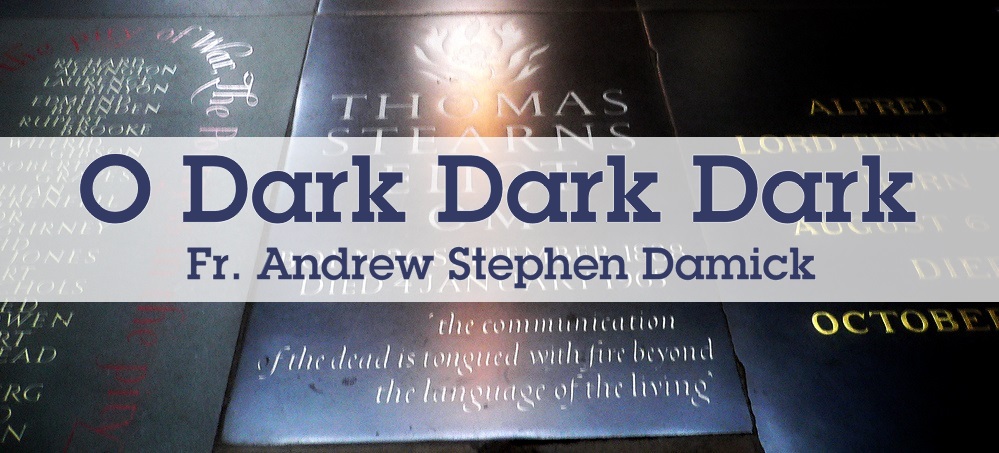
Today being the winter solstice, the shortest day here in the northern hemisphere, I thought I would point to this bit from T. S. Eliot that I always think of on this day:
O dark dark dark. They all go into the dark,
The vacant interstellar spaces, the vacant into the vacant,
The captains, merchant bankers, eminent men of letters,
The generous patrons of art, the statesmen and the rulers,
Distinguished civil servants, chairmen of many committees,
Industrial lords and petty contractors, all go into the dark,
And dark the Sun and Moon, and the Almanach de Gotha
And the Stock Exchange Gazette, the Directory of Directors,
And cold the sense and lost the motive of action.
And we all go with them, into the silent funeral,
Nobody’s funeral, for there is no one to bury.
I said to my soul, be still, and let the dark come upon you
Which shall be the darkness of God. As, in a theatre,
The lights are extinguished, for the scene to be changed
With a hollow rumble of wings, with a movement of darkness on darkness,
And we know that the hills and the trees, the distant panorama
And the bold imposing facade are all being rolled away—
Or as, when an underground train, in the tube, stops too long between stations
And the conversation rises and slowly fades into silence
And you see behind every face the mental emptiness deepen
Leaving only the growing terror of nothing to think about;
Or when, under ether, the mind is conscious but conscious of nothing—
I said to my soul, be still, and wait without hope
For hope would be hope for the wrong thing; wait without love
For love would be love of the wrong thing; there is yet faith
But the faith and the love and the hope are all in the waiting.
Wait without thought, for you are not ready for thought:
So the darkness shall be the light, and the stillness the dancing.
Whisper of running streams, and winter lightning.
The wild thyme unseen and the wild strawberry,
The laughter in the garden, echoed ecstasy
Not lost, but requiring, pointing to the agony
Of death and birth.– T. S. Eliot, from “East Coker” in the Four Quartets
These are some of my favorite lines in the Four Quartets. There’s a good bit to dwell on here, and as a former stagehand, I especially love:
As, in a theatre,
The lights are extinguished, for the scene to be changed
With a hollow rumble of wings, with a movement of darkness on darkness,
And we know that the hills and the trees, the distant panorama
And the bold imposing facade are all being rolled away.
It’s a remarkable metaphor, and I think that much of what happens in our lives is precisely this, a changing of scenes, of “darkness on darkness,” hidden from our view while it is happening and yet critical in its significance. Then the lights come up, and everything is changed.
Eliot’s lines aren’t about the solstice, of course, but that “dark dark dark” at the beginning always comes to mind today. And who can help applying these lines to these last few waiting days of Advent?:
I said to my soul, be still, and wait without hope
For hope would be hope for the wrong thing; wait without love
For love would be love of the wrong thing; there is yet faith
But the faith and the love and the hope are all in the waiting.
Wait without thought, for you are not ready for thought:
So the darkness shall be the light, and the stillness the dancing.
So, may you be blessed today in these final Advent days with this blessing: “I said to my soul, be still, and let the dark come upon you / Which shall be the darkness of God.”



Beautiful…eery…calming. Much to think about Father. I too like the lines about “changing scenes” darkness….then the lights!
And the stage manager is a still, small voice in my ear as I wait in the darkness for the warning for the next cue.
I have not read Eliot since college. Looks like I need to do some re-reading.
Thanks for the reminder.